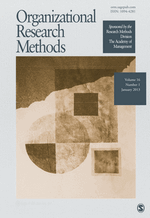Simulation for the Organizational Scientist
Editor’s note: We are pleased to welcome Dr. Guido Fioretti of the University of Bologna, whose article “Agent-Based Simulation Models in Organization Science” is forthcoming in Organizational Research Methods and now available in the journal’s OnlineFirst section.
One way of approaching organizations is asking oneself how do individual interests and actions align in order to produce regular interactions, routines, or stable chains of command. This amount to no less than asking oneself what organizational decision-making is.
These questions are surprisingly similar to certain questions that brain scientists typically ask: How does intelligence arise out of (relatively) simple neurons? How is it possible that the interactions between relatively simple components generate aggregate outcomes that are very different from those of the interacting components?
 Brain scientists invented neural networks, which have been the first instance of a wider class of connectionist models. Among these models, agent-based models are the most suitable for social science in general, and organization science in particular. They are extremely useful in order to investigate possible organizational configurations, often suggesting new research questions. Having built a few of them in order to investigate organizational research problems, I decided to use my experience in order to write an introductory paper.
Brain scientists invented neural networks, which have been the first instance of a wider class of connectionist models. Among these models, agent-based models are the most suitable for social science in general, and organization science in particular. They are extremely useful in order to investigate possible organizational configurations, often suggesting new research questions. Having built a few of them in order to investigate organizational research problems, I decided to use my experience in order to write an introductory paper.
***
Read the article, “Agent-Based Simulation Models in Organization Science,” in the OnlineFirst section of Organizational Research Methods. The abstract:
Agent-based simulation models can reproduce the interactions between members of an organization or between different organizations in an artificial environment where ‘‘agents’’ make decisions and communicate with one another. This article discusses possible applications to core issues in organization science and provides an introductory guide to simulation platforms. Agent-based modeling requires writing computer code, a skill that, if properly mastered, may turn into a career opportunity.
Click here to continue reading.























































































